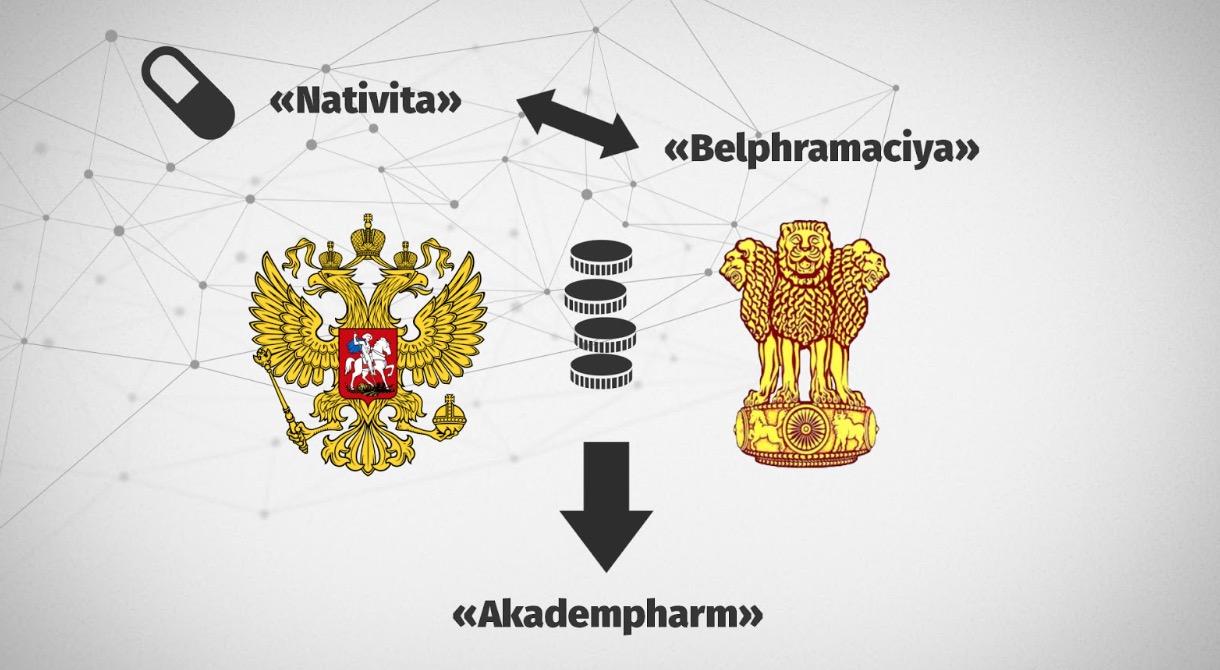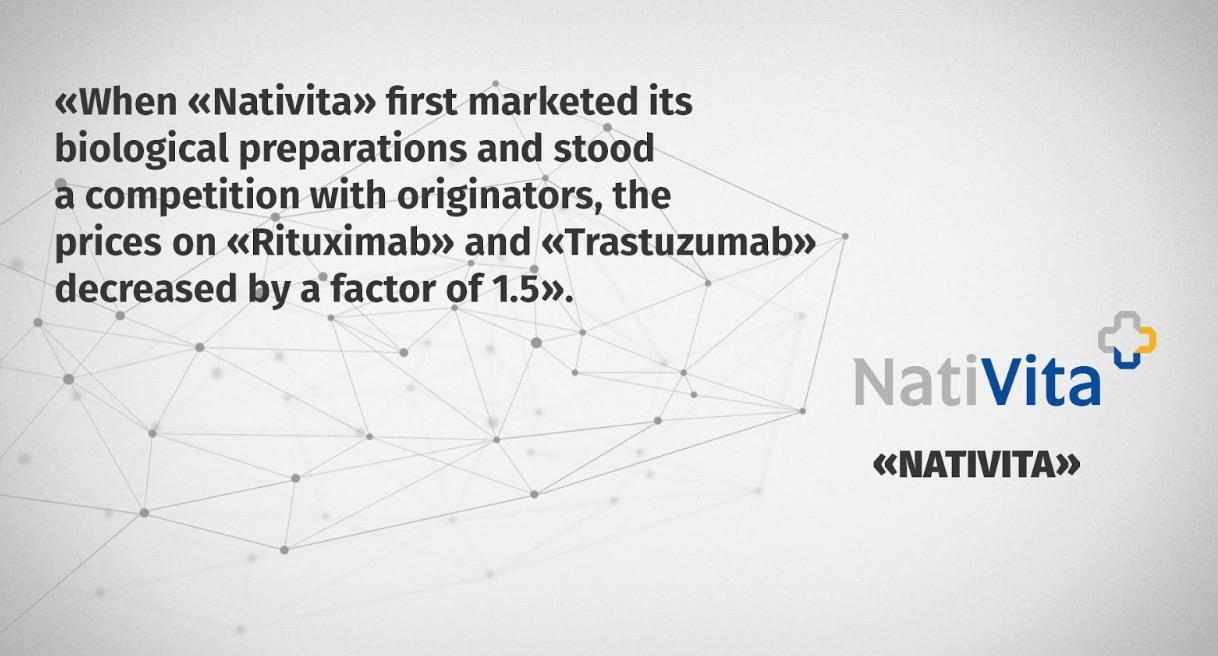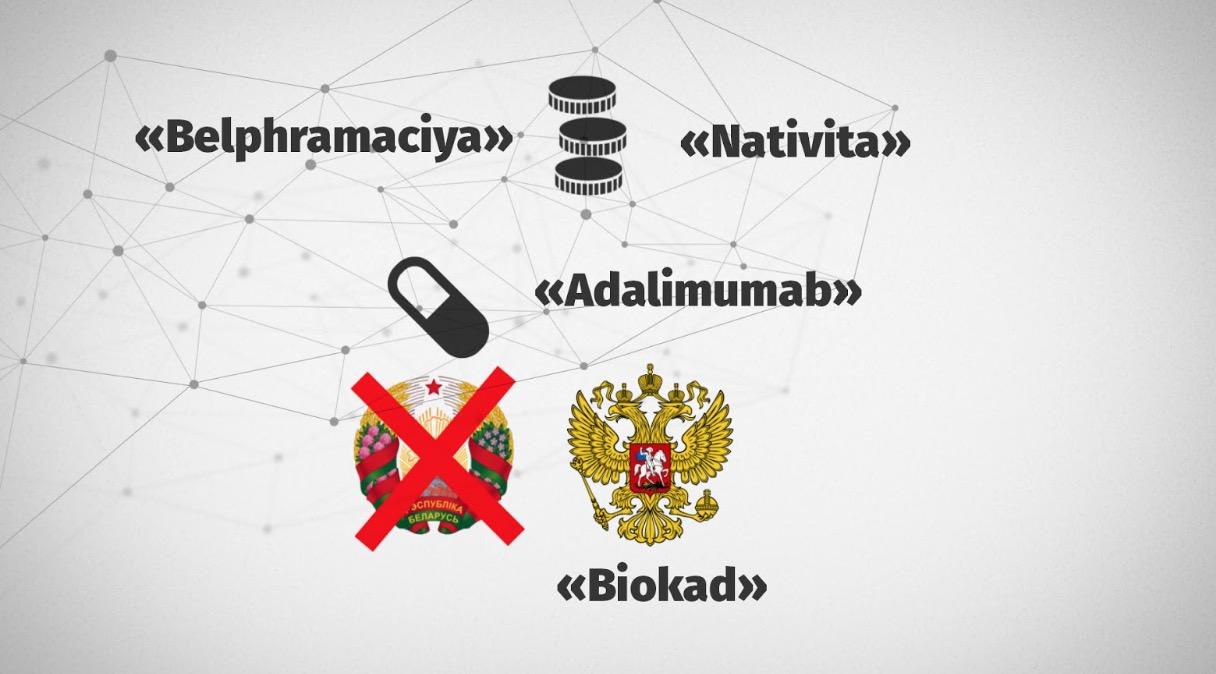This is about “Nativita'' company registered in the village Beshenkovichi, Vitebsk Province and the team “Davaite razbiratsya” who set the record straight in 2020. Let us recall that the public budget has been overpaying Alexey Sychev, the owner of “Nativita ''millions of dollars annually. The company received the producer status in Belarus and registered a number of their own pharmaceutical products. In fact, those were drugs imported from Russia and India that were actually only prepackaged in Belrus.

“If considered legally, the drugs are not being manufactured in Belarus. There is a lack of technology and the output that has to be produced by a Belarusian company is not enough. The country has a stake in showcasing the fact of import substitution”, - says Victoria Alexandrova, consultant of the capital spending project on pharmaceutical market.
The state had been buying analogs even more costly until “Nativita” entered the market. So, no wonder, that there is the impression of saving the budget. The following is the direct quote by “Nativita” in response to our enquiry:

“When “Nativita” first marketed its biological preparations and stood a competition with originators, the prices on “Rituximab” and “Trastuzumab” decreased by a factor of 1.5”.
However, the impression of saving is deceptive. The thing is that the government was purchasing original drugs, whereas “Nativita” imports generics that cost anything but one and a half less. According to Vladimir Kovalkin, the project manager of “Kosht Urada” (“Кошт урада”), their purchase price is ten times lower: “Given that a cost of foreign brand drug is much higher than any of generics manufactured in Russia, India or China, delta may be obtained if buying a generic under the guise of original. Take an amendment of exemption into account and you might split a dough. Add procurement value and the fact that it is medicine, the margin is high so you can make a buck.
We approached Dmitry Pinevich, the former Deputy Secretary and the current Minister of Health, to get the situation straight. Although the official response failed to reach us, we found out that procurement prices on “Trastuzumab”, “Rituximab” and “Lenalidomide” plummeted and are now much lower than in neighbouring countries. Thus, apart from recovering the due sum that “Belsat” mentioned in one of the articles, we estimate that “Nativita” is bound to provide the Ministry of Health with the drugs for free in the amount of $38 million rubles which roughly the same with the budgetary overpayment (but we didn’t have access to all tenders data).
Few weeks later “Nativita” commented on our investigation in the interview to with online news portal TUT.by by accusing the team “Davaite razbiratsya” of mind games:
“It is not technically accurate to compare retail and procurement prices as the drug in a pharmacy may be put on the market and sold under-priced due to either being infringing or its expiration date”.
Nonetheless, a range of products in the hospital segment is lacking in Belarusian drug stores, which makes our research tough to go through. That is why during our second investigation we relied on farm-gate price; in case of shortage of producer data we built upon the selling price ceiling and total price in the neighbouring countries. In doing so we made a research of the latest procurement deals and converted the sums into Belarusian rubles. So, as mentioned above, life-saving medicine indicated a significant fall in price.
The answers to these questions became clear when we had examined public procurement reports. It turns out that the old schemes have been anything but eliminated.
Governmental drugs procurement in 2020.
State company “Belpharmaciya” bought a medication for rheumatoid arthritis “Adalimumab” from “Nativita”. The preparation is marketed as manufactured in Belarus, however the real producer is a Russian company “Biokad”.

Its price (converted to BYN)) on russian manufacturer's website is 750 for 1 only one pack. Meanwhile, “Nativita” purchased 1000 packs of this medication for 1255,55 belarusian rubles per piece.
A similar medication produced by Swiss pharmaceutical you can get in Ukraine and the price will be roughly the same - 1290 (converted to BYN).
Russian oncologist and chemotherapist Polina Shilo agreed to tell us about benefits and drawbacks of russian generics:
“In order to claim that a generic is equivalent to original preparation, it has to undergo a number of studies. The reality is that generics go through a simplified registration system, which means that they skip all those testing stages that are a must for original medications. As a result, it turns out that not all generics are every bit as effective as originals; in other cases they may appear to be more toxic. Anyway, this doesn’t imply that all generics are bad. On the contrary, they make medical treatment affordable”.
This year “Nativita” is also the state supplier but this time of a so-called domestically produced Glatiramer Acetate for treating multiple sclerosis. And again the real manufacturer is the “Biokad” company. The price by the piece on its website is half lower than “Nativita” paid by gross from the state budget. The maximum price is allowed to exceed the price indicated by the producer by 10 per cent. Thus, procurement of only Glatiramer Acetate will bring “Nativita” another quarter of a million.
Sergey Satsuk, chief editor of “Daily planner” (“Ezhednevnik”) who has been studying tenders on medical equipment and medications procurement says that neither doctors’ actions nor changes of ministers managed to change the system:
“It’s not a matter of individuals or Zharko (Vasily Zharko). This system is a result of the actions of people who have a stake in it: businessmen, bureaucrats, the Ministry of Health, the Health Investigation and Research Centre. KGB got the “safest” infringers; the most active remain and maintain the system”.
Another purchase transaction was an antifungal preparation “Pazopanib”, which is supplied and packaged by “Nativita”, although the real producer is a Russian company “PharmaSynthesis-Nord”. The ceiling price for it in russian pharmacies is 1700 rubles per piece (wholesale and retail margin included).
But our open handed Ministry of Health agrees to pay 2564,41 ruble per package. According to the official documents at our disposal, the real delivery price is even three times lower. Thus, “Nativita” gets a profit of 500 dollars per piece.
However, Sychev doesn’t have the total lock on these categories of medications. From time to time other companies participate in tenders to get the right of supply to the Ministry of Health. Thus in 2018 “Nativita” gor this right due to its price lower by 500 rubles . But its competitor was none other than “VitVar” that belonged to Alexey Sychev (the owner of “Nativita”).
Vladimir Kovalkin, head of the project “Kosht uradu” sets out an idea on this matter:
“The Ministry of Antimonopoly Regulation doesn’t comment on these issues. A reasonable question arises why the whole Ministry lets affiliate companies simulate competition and win tenders”.
As a matter of fact, “VitVar” keeps on getting benefits from authorities being generous. The plan for 2020 states that “VitVar” was going to supply 323 packs of medication for leukemia by Swiss production at a cost of 9000 rubles per piece, while in neighbouring Russia the maximum price of exactly the same preparation accounts for about 5500 BYN. Thus, another half a million dollars casts off the budget.
Sergey Satsuk, chief editor of “Daily planner” (“Ezhednevnik”) claims that the cost of these medications has been decreasing by 50% for the last 5 years. He is sure that at first they raised it by 12 times and then were marking it down in order to state that they are doing so”.
Although “Nativita” was registered 9 years ago and the factory started almost 5 years ago, by this moment there are 17 medications available on their websites in the section “Products”.
Let us recall that the company participated in the state programme of import substitution, which had been executed for 4 years and completed in 2020. As seen in the latest report, medications from Ukraine and India are being repacked by “Belalek” that also started during the programme.
Victoria Alexandrova, consultant of the capital spending project on pharmaceutical market: “In terms of pharmaceutical safety of the country the preparation that is 90% manufactured abroad makes us totally dependent on foreign countries”.
Then who is this authorities’ favourite Alexey Sychev?
He founded his company “VitVar” (Abbr “Vitebsk - Warsaw”) in 1993. Back at the time the company started as a soap supplier and only afterwards it proceeded with medications. Then he founded “AkonitPharma” specialised in homeopathic remedies and in 2012 “Nativita” entered the market. All these companies have repeatedly submitted a bid.
As regards “Nativita”, a part of the funding had been shifted from lithuanian businessman Gediminas Ziemelis, co-owner of “Nativita”, who has connections with upper echelons of Russian authorities:
“One of Zhiiemialis’s business partners is the Ragimov family, whose head is the former classmate and a close friend of Putin’s. His business was repeatedly acknowledged a threat to national security of Lithuania due to this tight connection with Russia”, - reports Marus Lavrinavichus, senior analyst of Vinius Institute of Policy Analysis.
“Nativita” is affiliated with the International Holding “Pharnasanta Group” that belongs to Zhiiemialis. However, this is what we received from Nativita’s management:
Today Alexey Sychev remains a co-owner on belarusian side, meanwhile “VitVar” came under the direction of Sychev’s wife Svetlana Golovkina and his eldest son Vladimir.
In the middle of last year we learnt that Alexey Sychev left for Slovakia. It is said that his departure is connected with the “health-care personnel case” - the businessman was implicated in the outrageous trial under the Part 2 of article 431 (“Multiple bribes”). However, Alexey Sychev failed to appear in court due to his sudden illness and in 2020 only a penalty was ordered by the court.
Alexey Sychev secured the financial support of Gediminas Ziemelis who is tightly connected with the top tier of Russian Government. The former ran the schemes when Vasily Zharko was the Minister Of Health. It can be assumed that these two had met each other long before the procurement reports were posted on the Internet.

In autumn last year it became known that the apartment that belonged to Zharko carried over the youngest Sychev’s son Alexey in 2018.
“Nativita” personnel rushed to explain the situation to TUT.by right after our investigation was published:
“Sychev’s wife Svetlana Golovkina purchased the apartment from Zharko’s daughter “at the market price” in 2011 but seven years later she gave it as a gift to her son Fedor”. This was later confirmed.
“It’s common not only in Belarus, it’s a widely-used way of bribing. That is why deals between stakeholders and businessmen should be banned in any state”, believes Sergey Satsuk, chief editor of “Daily planner” (“Ezhednevnik”).
As a matter of fact, Vasily Zharko as well as Alexey Sychev avoided responsibility for the “heal-care personnel case” regardless of the fact that the schemes originated when Zharko was the Head of the Ministry.
Sergey Satsuk, chief editor of “Daily planner” (“Ezhednevnik”) quotes Lukashenko: “I don’t think that the Ministry wasn’t aware of these facts.” Then he adds that right after this statement was made, Zharko resigned.
Vasily Zharko obtained a few apartments and built a cottage during his leadership. The former Minister has a tendency to transfer the ownership right to his daughter Olga who became a three-room flat owner at Nemiga (the apartment was eventually sold to Sychev’s wife). Today its market price accounts for $165.000.
For the time being Olga (Zharko’s daughter) is the owner of another flat next to Drozdy (microdistrict in north-west Minsk where top state officials live), which costs $300.000.
Behind the National Library there is a private residence where Vasily Zharko lives now. The residence, whose total area is 500 sq.m. and is estimated at $1 mln., was being built when Zharko was the Minister and completed when Zharko took the position of vice-president.
The scandal about belarusian “Phenibut” broke in 2019, when Vladimir Karanik became the Minister of Health. The matter of this was that its price in Russia was lower than in Belarus by 5 rubles.
The Ministry monitored the price and noted that there was a significant difference in some positions. Nevertheless, the situation didn’t change for the better in 2020.
In 2021 former deputy Dmitry Pinevich took the post of the Minister of Health, who personally signed the GMP certificate for “Nativita”. No wonder, that the budget continues to be wasted.
Zmiter Pankovets, “Nasha Niva” journalist, remembers that Lukashenko’s decision to appoint Pinevich was made on his way to Grodno. Zmiter Pankovets adds that Pinevich was assigned because of immediate changes in administration - Karanik was sent to rule the Grodno Region committee. Apparently, Pinevich at the time proved to be the best option as he used to be the deputy. So Pinevich continued to move the ball further, which caused a storm of indignation among the medical community: “The budget is losing money, whereas the personal wealth of the current Minister is growing. As a Deputy Minister of Health he built a mansion which cost a quarter of a million!”
How about the Minister himself? We came to the office of the Ministry of Health for his comment but the Minister sneaked out into his cabinet. Our reporter followed him with his camera on but it turned out that the Minister mysteriously escaped.
As we can see, these suspicious schemes are pressing ahead despite investigators’ and journalists' pursuits. The schemes have been carried on from the former Minister Vasily Zharko, who is known as Nikolay’s Lukashenko grandmother protege, to his long-term Deputy and incumbent Minister of Health Dmitry Pinevich.
What concerns the import substitution programme, it can’t be claimed that it is absolutely fake - Belarusian manufacturing finally appeared.
But let us conclude on the “Nativita” case. We found out that the preparation “Velpanat” for Hep-C was purchased by the government for 117 rubles, while its cost in the pharmacies is 417 rubles. There comes a surprising medical instruction: “The medication requires additional control that facilitates its precautions while being used to be identified. You can help by reporting about any side effects that occurred during drug administration (including the case if the medication fails to be effective)”.
Does it mean that poorly studied medication has entered the market? What is the cause of these additional cautions? These and other questions that occurred during our investigation were sent to “Nativita”, “VitVar” and the Ministry of Health. We will post the answer that was promised to be given in two weeks.
What concerns Alexey Sychev, he and his relatives bought not only apartments in MInsk during their cooperation with the Healthcare System but also a two-storey cottage with a total area of 300 sq.m. with an access to the lake. Its cost accounts for $100.000.
However, the cottage was later sold to one of Sychev’s relatives when Alexey was heading to Slovakia. This choice was made on purpose: Alexey Sychev is the Honorary Consul of Slovakia and has representation of “Nativita”.



